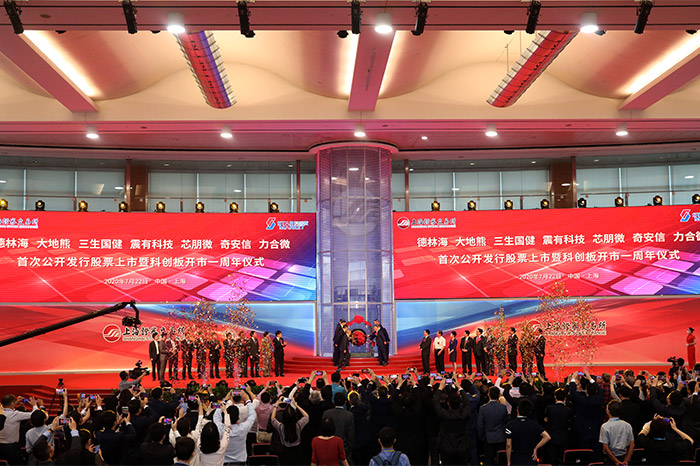(ATF) The Hong Kong and Shanghai stock exchanges have announced that eligible A-shares listed on mainland’s Nasdaq-style tech board will be made available for trading through the Stock Connect scheme from February 1.
Starting February, shares listed on the Shanghai Stock Exchange’s Sci-Tech Innovation Board (STAR Market) that are constituent stocks of the SSE 180 and SSE 380 indices, or have H-share counterparts listed in Hong Kong, will be eligible for ‘northbound’ trading of Stock Connect, the Shanghai Stock Exchange said in a statement last Friday. Accordingly, their corresponding H-shares will be included in ‘southbound’ trading under the scheme.
Only institutional professional investors will be eligible to trade STAR Market-listed shares via the ‘northbound’ leg of Stock Connect, Shanghai Stock Exchange said.
The expansion arrangements will add 12 STAR Market-listed shares to the ‘northbound’ leg of Stock Connect. They are Advanced Micro-Fabrication Equipment, which is a constituent of the SSE 180 index, six companies in the SSE 380 index, such as Qingdao Haier Biomedical and Raytron Technology, as well as six “A+H” dual-listed companies such as Haohai Biological Technology, and Shanghai Fudan-Zhangjiang Bio-Pharmaceutical.
The H-shares of the six “A+H” dual-listed companies will be included in ‘southbound’ trading of the scheme.
The change, which follows an agreement between the stock exchanges in Hong Kong, Shanghai, and Shenzhen last month, comes as China is pressing ahead with measures to open mainland financial markets to foreign capital.
The move will help attract more foreign investors into the STAR Market, improve the “investor structure” of China’s capital market and increase its international exposure, the Shanghai Stock Exchange (SSE) said.
Bringing in more foreign capital has been part of China’s bid to introduce more professional investors to the stock market, in which over 90% are retail investors and speculation has taken over from valuation.
The Stock Connect scheme, first launched in November 2014, gives investors access to both markets when investing in A-shares in the mainland and H-shares in Hong Kong. It consists of a ‘southbound’ component that allows mainland Chinese investors to invest in H-shares and a ‘northbound’ component for international investors to invest in the opposite direction.
International index inclusion
The addition of STAR Market-listed shares in the Stock Connect scheme will also make them eligible to be included in the FTSE Global Equity Index Series (GEIS), according to criteria revealed by FTSE Russell last year.
FTSE Russell will announce the results of the semi-annual index review on February 19 and all qualified shares listed on Shanghai’s STAR Market that meet standards for induction will be included in the GEIS, China Securities Journal said, citing a source from FTSE Russell. The updated indexes will take effect at market opening on March 22, the newspaper added.
Besides, inclusion in the Stock Connect scheme will also make STAR Market-listed shares eligible to join MSCI’s flagship index.
Earlier additions of individual stocks to the MSCI and GEIS global indices spurred foreign buying of shares listed on Chinese mainland bourses. Analysts expect this latest round of inclusion to pique investors’ interest.
More interaction between mainland and HK
“There will be more interactions between A-shares and H-shares in the future… which means the difference between the valuation of A-shares and their H-share counterparts will be narrowed,” Fu Lichun, an economist and the founding partner of YTI Capital, said.
While China’s blue-chip index has approached an all-time high, some investors are turning to cheaper Chinese shares listed in Hong Kong, where many of China’s biggest and most popular companies are listed, such as Tencent and Meituan. Others like JD.com held secondary listings in Hong Kong last year.
Companies’ A-shares listed in China are currently trading at a more than 30% premium over their Hong Kong-listed shares.
“Assuming the size of total capital is unchanged, money will flow between the two markets alternately, and the two markets’ fluctuation will likely become more frequent and more intense,” Fu said.
In a rally driven by continued funding from mainland-based traders, Hong Kong’s Hang Seng Index jumped 2.4% on Monday, closing above the 30,000-point level for the first time since May 2019.
“While H-shares are becoming more like A-shares, A-shares will also be more internationalized. The expansion of the Stock Connect scheme will attract more international investors to the A-share market, and in turn bring an influence of more professional valuation and investment strategies to mainland,” Fu said.
The STAR Market, launched in July 2019, is China’s answer to Nasdaq. There are now 221 companies with a combined market cap of 3.61 trillion yuan (US$558 billion) listed on the STAR Market, according to data released by the Shanghai exchange.
























